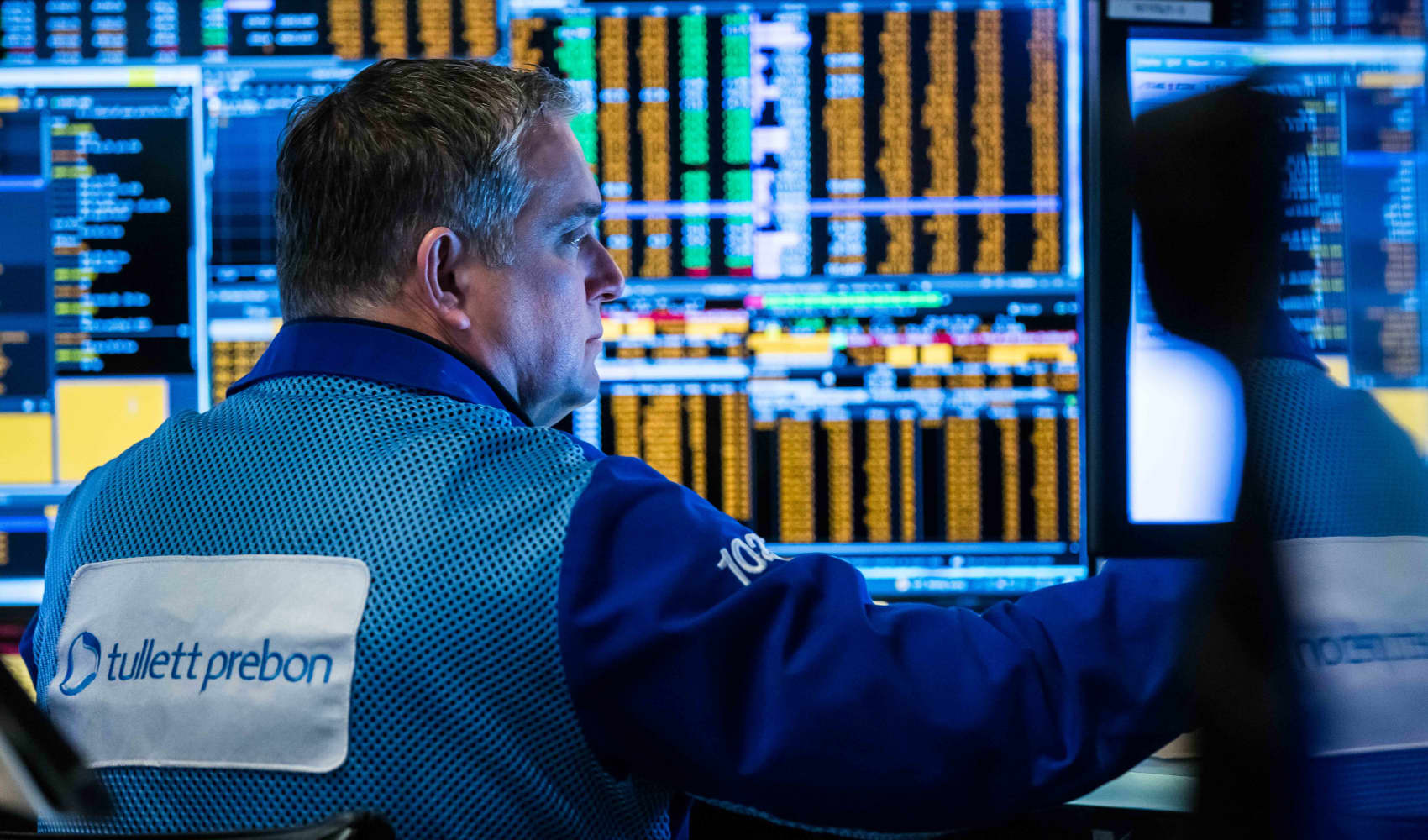
People walk inside the Korea Exchange (KRX) building, as stock markets in Asia as a whole have been affected by the intensifying political turmoil over president Yoon Suk Yeol’s role in martial law, in Seoul, South Korea, on Dec. 9, 2024.
This is CNBC's live blog covering Asia-Pacific markets.
Asia-Pacific markets mostly climbed Thursday, after U.S. markets soared on the back of an unexpected decline in core inflation numbers in December and strong bank earnings.
Korea's central bank surprised market watchers by keeping benchmark rates unchanged at 3%. Economists polled by Reuters had expected the Bank of Korea to cut its policy rate by 25 basis points.
South Korea's Kospi ended the day up 1.23% to 2,527.49, while the small-cap Kosdaq index was up 1.77% to 724.24 following the announcement. The Korean won last weakened slightly to trade at 1,456.91 against the greenback.
Get top local stories in San Diego delivered to you every morning. Sign up for NBC San Diego's News Headlines newsletter.
Japan's benchmark Nikkei 225 closed up 0.33% to 38,572.60, while the Topix lost 0.09% to 2,688.31.
Japan's annual producer price index climbed 3.8% in December, in line with expectations of economists polled by Reuters.
Hong Kong's Hang Seng index was up 1.08% in its final hour of trade, while mainland China's CSI 300 gained 0.11% to end the day at 3,800.38.
Money Report
Over in Australia, the S&P/ASX 200 ended the day up 1.38% at 8,327.
The country's seasonally adjusted unemployment rate for December rose slightly to 4% from November's 3.9%, in line with estimates by economists polled by Reuters.
Overnight in the U.S., stocks saw significant gains with all three major averages recording their best day since Nov. 6.
The Dow Jones Industrial Average dropped 1.65%, while the S&P 500 gained 1.83%. The tech-heavy Nasdaq Composite rallied 2.45%.
Meanwhile, the benchmark 10-year Treasury yield dropped sharply at about 4.65% or around 13 basis points on the back of the CPI report.
Oil prices rose following news of the Israel-Hamas ceasefire and hostage deal. Brent crude gained 0.21% while the WTI edged up 0.29% to $80.27 per barrel.
— CNBC's Hakyung Kim and Lisa Kailai Han contributed to this report.
TSMC fourth-quarter results top expectations, net profit surges 57% on robust AI chip demand
Taiwan Semiconductor Manufacturing Company's fourth-quarter revenue and profit beat expectations, as demand for advanced chips used in artificial intelligence applications continued to surge.
Here are TSMC's fourth-quarter results versus LSEG consensus estimates:
- Net revenue: 868.46 billion New Taiwan dollars ($26.36 billion), vs. NT$850.08 billion expected
- Net income: NT$374.68 billion, vs. NT$366.61 billion expected
TSMC's revenue in the December quarter rose 38.8% from a year earlier, while net income rose 57%.
The company's shares rose 3.75%.
Read the full story here.
— Dylan Butts
Bank of Korea leaves rates unchanged in a surprise move, warns GDP growth ‘highly likely’ to miss forecasts
South Korea's central bank Thursday held its benchmark policy rate at 3% in a surprise move, opting to assess changes in domestic and external economic conditions after having delivered two back-to-back cuts in its previous meetings.
Economists polled by Reuters had estimated a 25-basis-points cut.
In its statement, the BOK said that while inflation had stabilized and household debt had slowed down, "downside risks to economic growth have intensified and the volatility of exchange rates has increased due to the unexpected political risks that have recently escalated."
The bank also said that uncertainty has also increased due to "changing domestic political situation and economic policies in major countries."
Read the full story here.
— Lim Hui Jie
Toyota shares drop as subsidiary set to pay $1.6 billion to settle emissions fraud scheme
Shares of Toyota lost 2.53% after the a Toyota subsidiary, Hino Motors, agreed to plead guilty to an emissions fraud conspiracy, a statement released by the U.S. Department of Justice wrote.
Hino Motors is slated to pay over $1.6 billion in settlement. The Toyota unit was reported to have fabricated emissions data for years to get an edge over competitors, the U.S. Justice Department noted.
— Lee Ying Shan
Australia's employment figures in December top expectations by wide margin
Australia's employment in December exceeded forecasts by a wide margin, jumping 56,300 jobs from November. Reuters estimates had pegged job additions at 15,000.
The jobless rate climbed 4% in line with expectations and compares against a 3.9% rise recorded in November.
The country's workforce participation rate rose to 67.1%, slightly higher than Reuters' forecast of a 67% jump.
— Lee Ying Shan
Japan's annual producer price index climbs 3.8% in December
Japan's annual producer price index in December climbed 3.8%, led by increase in the prices of electric power, gas and water as well as agriculture, forestry and fishery products.
The latest figure for December is in line with expectations of economists polled by Reuters.
Japan's producer price index measures the wholesale prices of goods and services sold by manufacturers and producers.
— Amala Balakrishner
Oil prices extend rally as U.S. sanctions on Russia raise worries over supply disruption
Oil prices extended their rally even as Israel and Hamas reached a ceasefire deal to end a15-month war in the Gaza Strip.
Futures for global crude benchmark Brent rose 3.22% to $82.49 per barrel, while U.S. West Texas Intermediate futures added 0.42% to $80.38 per barrel.
"Given [how] there has been no disruption to oil supply in the Middle East due to the Gaza war, the ceasefire there wont result in any incremental supply returning," said MST Marquee's senior energy analyst Saul Kavonic.
"What is becoming clearer is sanctions on Russian supply are actually ramping up, and tougher sanctions on Iranian supply are looking inevitable and imminent," he told CNBC via email.
— Lee Ying Shan
Who'd buy Ubisoft? The top potential suitors

After delaying the launch of its latest Assassin's Creed game and hiring advisors to review its options, Ubisoft has been shrouded in speculation over whether a potential takeover could be in the works.
The French video game publisher last week pushed back the release date for "Assassin's Creed Shadows" to March.
It also appointed advisors to review "transformational strategic and capitalistic options to extract the best value for stakeholders."
Ubisoft said it would "inform the market in accordance with applicable regulations if and once a transaction materializes."
CNBC spoke to industry analysts about which names they think could emerge as potential buyers of the game maker. Click here to read the full story.
- Ryan Browne
Equities becoming more sensitive to yields, says Nationwide strategist
Growth stocks such as Tesla and other Big Tech names popped Wednesday after Treasury yields dropped on the slowdown in core inflation from December's consumer price index report.
The pullback in yields following the CPI report is "a welcome relief following a 1.2% move in the 10-year Treasury yield since September," said Mark Hackett, chief market strategist at Nationwide.
"Equity investors have become increasingly sensitive to moves in the bond market, with an intense focus on rates, inflation, and Fed policy," Hackett added.
— Hakyung Kim
Economic growth, inflation tick higher, Fed 'Beige Book' shows
Economic activity ticked up over the past seven weeks, as did hiring and prices, according to an update Wednesday from the Federal Reserve.
The Fed's "Beige Book" characterized growth as up "slightly to moderately" across its 12 districts as consumer spending and vehicle sales picked up while construction pulled back due to higher costs for materials and financing.
On the labor market, the report said half the Fed districts saw a "slight increase" in hiring while the rest were flat. Wage growth also moved at a "moderate" pace.
Turning to inflation, prices rose "modestly overall" with pullbacks noted in retail and manufacturing.
—Jeff Cox






